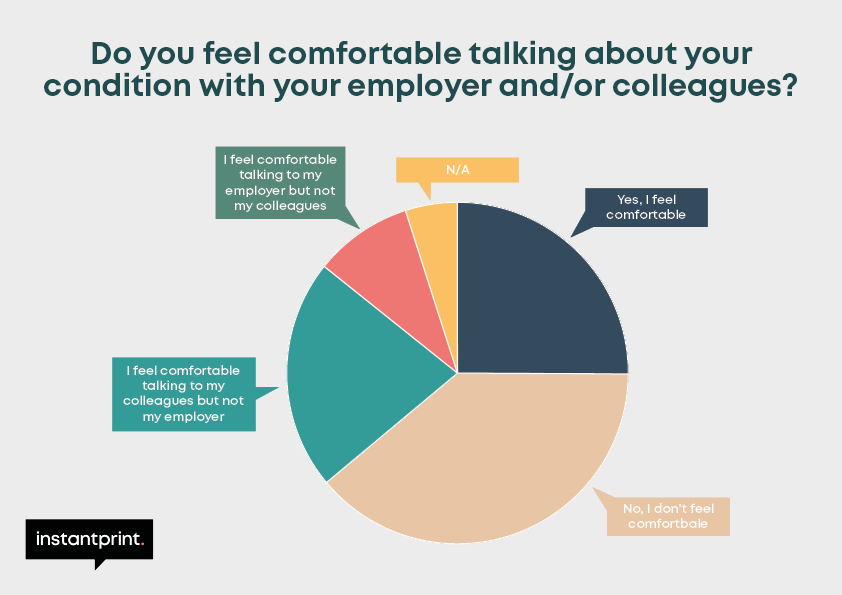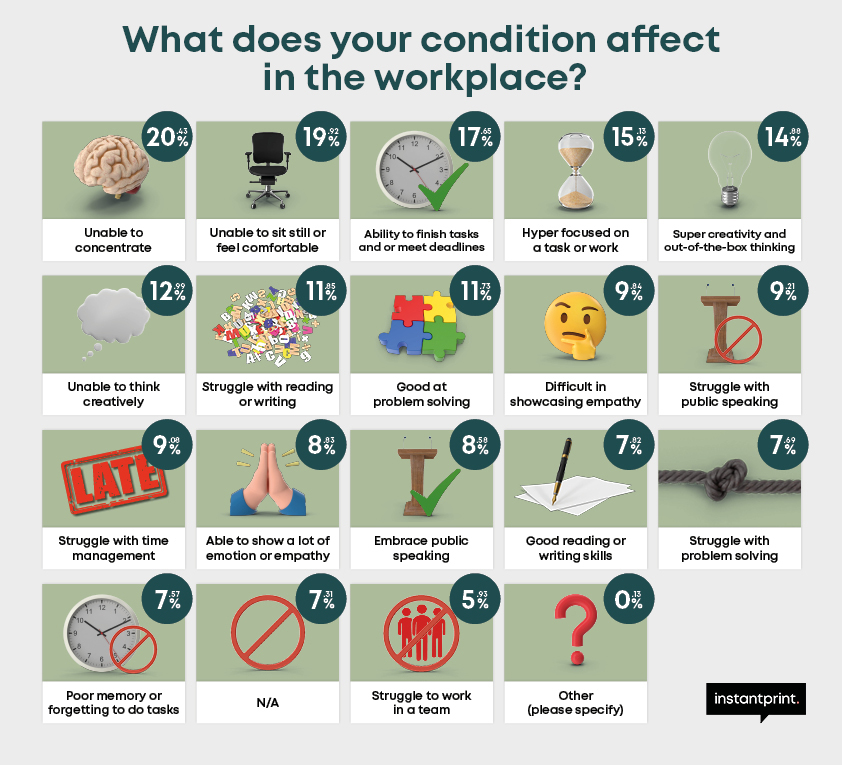Neurodiversity is the concept that all humans vary in terms of our neurocognitive ability. - Genius Within
Neurodiversity encompasses a range of conditions and affects a significant portion of the population, with estimates suggesting up to 15-20% of the population are neurodivergent.
In the realm of employment, understanding the unique needs and experiences of neurodivergent employees is vital. While some conditions may qualify as disabilities under the Equality Act 2010, not all individuals classify themselves as such.
To gain deeper insights into the experiences of employees navigating neurodiversity, their coping mechanisms, the support provided by employers, and the perspectives of neurotypical individuals, we quizzed over 1,000 UK office workers with the aim of uncovering prevailing opinions regarding neurodiversity in the workplace to determine whether, in 2023, it remains taboo to reveal one's neurodivergent condition to colleagues.
Diagnosis Within Reach? Only For Men
Our survey revealed that over 90% of respondents identified as being diagnosed with a neurodivergent condition. From autism to dyslexia, it seems that neurodiverse conditions can be found all across the workplace.
Only 6% answered ‘no’ to being asked if they had been diagnosed with a neurodivergent condition and 2% suggested that they are in the process of trying to get a diagnosis.
Of the 90% surveyed that have been diagnosed, a significant 70% were male, while only 30% were female. However, among those currently seeking a diagnosis, the gender distribution was notably different, with 62% being female and 38% being male. These findings further reinforce recent research indicating that women are less likely to receive a neurodivergent condition diagnosis compared to men.
Rise of TikTok Self-Diagnosis
It appears that an increasing number of individuals are turning to social media platforms for insights into their neurodivergent conditions. Notably, the hashtag #adhd has amassed over 26.2 billion views on TikTok alone, indicating the prevalence of discussions and content related to this topic.
Among the respondents who confirmed having a neurodiverse diagnosis, 16% fell into the 18-24 age group, 56% were aged 25-34, 22% were aged 35-44, and 6% were aged 45 and above. This suggests that recent advancements in understanding and awareness, largely facilitated through social media platforms, have played a significant role in younger individuals seeking and obtaining diagnoses.
In contrast, among individuals aged 45 and above, 54% are currently in the process of seeking a diagnosis in adulthood. This signifies that a large portion of the older age group is seeking diagnosis later in life, either due to it not being picked up when they were younger, being misdiagnosed with other conditions or being diagnosed off the back of their children’s diagnoses and recognising the traits themselves.
These findings prompt us to reflect on the evolving landscape of neurodiversity discussions, particularly on social media platforms, and the impact they have on diagnosis-seeking behaviour across different age groups. It brings to light the question of whether this increased visibility is breaking the silence and stigma surrounding neurodivergent conditions or creating additional barriers for those seeking diagnoses in later stages of life.
@jenorourkemft Girls are more likely to have the inattentive type of ADHD. Symptoms often aren’t as obvious #adhd #neurodivergent ♬ tbtrack - Maylene
Breaking the Silence or Taboo for You?
For those that answered ‘yes’ I have been diagnosed with a neurodivergent condition, we wanted to know whether they feel comfortable talking to their employer and or colleagues about their condition.
• No, I don't feel comfortable talking about my condition- 39%
• Yes I feel comfortable talking about my condition- 25%
• I feel comfortable talking to my colleagues but not my employer - 22%
• I feel comfortable talking to my employer but not my colleagues - 9%
A significant proportion, approximately 39%, almost 2 in every 5, of diagnosed respondents indicated a lack of comfort when discussing their neurodivergent condition with colleagues or their employer. It seems that even in 2023, neurodiversity remains a sensitive and somewhat taboo subject within the workplace. Whether that’s through personal choice, masking (when someone with a neurodiverse condition copies other people’s body language and manerisms etc to try and fit in) or apprehension regarding potential judgement or discrimination, employees are hesitant to openly share about their experiences.
A quarter of respondents expressed a sense of comfort when discussing their neurodivergent condition, potentially motivated by a desire to challenge stigmas, serve as advocates, and inspire their colleagues within the workplace.
A notable 22% of participants revealed that they feel at ease discussing their neurodivergent condition with colleagues and close work friends, yet they experience discomfort when broaching the topic with their employer. This raises questions about their perception of inadequate support or potential discrimination within the workplace. Conversely, a shocking 9% only expressed comfort in conversing with their employers while withholding such discussions from their colleagues, possibly due to concerns about being labelled as receiving preferential treatment.
Regarding age demographics, among those who expressed comfort in discussing their condition, a significant majority of 75% fell within the 18-34 age range. This observation indicates that the younger generation exhibits a greater willingness to openly disclose their neurodivergent condition within the professional realm.

Dancing with Distraction
We asked our neurodivergent respondents to provide insights into the positive and challenging effects of their condition within the workplace.
• Unable to concentrate - 20%
• Unable to sit still or feel comfortable - 20%
• Ability to finish tasks and or meet deadlines - 18%
• Hyper-focused on a task or work - 15%
• Super creativity and out-of-the-box thinking - 15%
• Unable to think creatively - 13%
• Struggle with reading and writing -12%
• Good at problem-solving - 12%
• Difficulty in showcasing empathy - 10%
• Struggle with public speaking - 9%
• Struggle with time management - 9%
• Able to show a lot of emotion or empathy - 9%
• Embrace public speaking -9%
• Good reading and writing skills - 8%
• Struggle with problem-solving - 8%
• Poor memory or forgetting to do tasks - 8%
• Struggle to work in a team - 6%
• N/A - 7%
• Other (please specify) - 0.13%
Taking the top spot, 20% of respondents disclosed their struggle with maintaining focus and concentration at work. Often a common factor for neurotypicals, as well as neurodivergent individuals, excessive distractions or a task being understimulating can significantly impede individuals from effectively completing their responsibilities.
Next up was being able to sit still and feel comfortable. Battered office chairs, wonky screens and room temperature are all factors that can impact comfort for neurodiverse individuals. These are all factors that can cause overstimulation, as a result, too much of some external stimulus or stimuli is enough for a person's brain to process and integrate effectively.
In third place was the ability to finish tasks and or meet deadlines. Sitting hand in hand with being unable to concentrate and unable to feel comfortable, creating overstimulation, it’s no surprise that those with neurodivergent conditions may struggle to hit deadlines.
Contrary to the challenging aspects, being diagnosed with a neurodivergent condition brings about positive attributes as well. A noteworthy 15% of respondents reported hyper-focusing on tasks or their work, while an additional 15% highlighted their remarkable creativity and ability to think outside the box. Furthermore, 12% emphasised their proficiency as effective problem solvers. These findings underscore the unique cognitive differences inherent in neurodivergent individuals, which facilitate distinct perspectives and approaches to the world, often leading to artistic pursuits and creative endeavours.

Too Far or Not Far Enough?
We surveyed both neurotypical and neurodivergent employees to gather their perspectives on whether employers should prioritise supporting neurodiversity in the workplace.
The responses were evenly divided, with 48% indicating that employers should indeed support neurodiversity in the workplace. Notably, among those who answered affirmatively, 92% had previously disclosed being diagnosed with a neurodivergent condition.
However, 50% said yes employers should support neurodiversity, but only to a certain extent. It appears that while these employees acknowledge the need for additional tools and accommodations to facilitate job performance, they may be less receptive to other employees receiving extended deadlines, extra breaks and being allowed to work from home. If they can’t have it, it seems no one can.
A mere 2% of participants expressed the belief that employers should not provide support for individuals with neurodiversity. Notably, 78% of these respondents identified as neurotypical, indicating that they have never been diagnosed with a neurodivergent condition. This finding aligns with expectations, as those without personal experiences of neurodiversity may have differing perspectives on the extent of employer support necessary.
A Struggle For Support
We also asked respondents whether they think their employer currently supports neurodiversity in their workplace.
• Yes, my employer supports neurodiversity but is too accommodating - 29%
• Yes, my employer supports neurodiversity but could do more - 28%
• Yes, my employer supports neurodiversity completely - 24%
• No, my employer does not seem to support neurodiversity - 7%
• I'm not sure - 7%
• No, my employer makes it harder for those with neurodiversity - 4%
• Other - 1.01%
Surprisingly, 29% of respondents revealed that their employers exhibit support for neurodiversity but are perceived as overly accommodating. Additionally, 4% expressed that their employers actually make work more challenging for individuals with neurodivergent conditions.90% of those who reported experiencing increased work difficulties were individuals diagnosed with a neurodiverse condition. These findings suggest that despite the progress made in acknowledging neurodiversity, obtaining sufficient support in the workplace remains a persistent challenge in the current era.
In terms of industry breakdown, among those who indicated that their employers make it harder for individuals with a neurodivergent condition, 24% belonged to the Business and Information sector, while 21% were associated with the Creative, Arts, and Design field. These findings suggest that individuals working in information-intensive roles or facing tight campaign deadlines may encounter challenges in receiving adequate support from their employers.
One respondent even shared under ‘other’; that “I am my own employer now due to not being able to cope in companies anymore”.
A whopping 28% also shared that their employer does somewhat support neurodiversity but could definitely do more.
A notable 24% of respondents expressed satisfaction with their employers' complete support for neurodiversity. Industries that stand out for their commitment to supporting neurodiversity are Education, Leisure, and Marketing, Advertising, and PR. The caring nature intrinsic to the education sector and the creative outlets found in marketing appear to contribute to a higher likelihood of employee support in these fields.
Championing Inclusion
While there may be differing opinions on neurodiversity support in the workplace, it is important to acknowledge that employers are actively taking steps to provide assistance and support. In our survey, we asked employees what their employer currently does to support those with neurodivergent conditions.
Taking the top of the table at 24%, almost a quarter, was being given the choice to work from home. Away from distraction and somewhere comfortable and familiar, it’s probably no surprise that neurodiverse employees are allowed to work from home to help them meet deadlines and get work done. After all, the last few years have proven the true benefits of working from home post-pandemic, including neurotypicals. This was coupled in second place with flexible working hours which clocked up 19% of votes. This accommodating approach allows employees to tailor their work schedules to better suit their individual needs, creating an environment conducive to optimal performance for neurodiverse colleagues.
Furthermore, 18% of respondents shared that their employers permit additional breaks, recognising the importance of rest and rejuvenation for neurodiverse individuals.
Additionally, 14% mentioned that their employers provide dedicated booths, break rooms, or pods specifically designed for recharging and relaxation. These designated spaces allow neurodiverse employees to find solace and regain focus when needed.
Unlocking Conversation
A noteworthy 11% of respondents indicated that their employers demonstrate support by employing positive and inclusive language. Similarly, another 11% shared that their employers prioritise clear, direct, and concise communication across all channels, facilitating better understanding. It’s clear to see that employers don’t need to shell out on expensive incentives, it’s as simple as starting with the right language and having the right conversations.
Prioritising Emotional Well-being
A notable 10% of respondents revealed that their employers currently grant them the flexibility to take duvet days or mental health days when they are not feeling their best. Additionally, 8% reported that their employers offer some form of counselling or therapy services. Moreover, 15% of respondents stated that their employers provide a bank of support lines, informational leaflets, or accessible resources that can be readily accessed and utilised by employees.
Return to Work? No Thank You
Regrettably, not all employers are fully embracing inclusivity. In our survey, we asked respondents about the measures they would like to see their employers implement in order to better support neurodivergent employees.
Topping the list at 21%, employees expressed their desire for the option to work from home, while 17% sought flexible working arrangements. It appears that despite many individuals having experienced the benefits of remote work during the lockdown period, the return to the office is not favoured by neurodiverse employees.
Following closely behind, 16% of employees expressed a need for more breaks, recognizing the importance of adequate rest. Meanwhile, 14% called for investment in programs and software, such as text-to-speech tools, to facilitate their productivity and communication.
At the lower end of the list were requests for noise-cancelling headphones or earplugs, which garnered 6% of the responses. Similarly, fidget and stim toys were mentioned by 5% of employees, suggesting that these items may be preferred as personal purchases or may already be owned by the individuals.
A Note From The Experts
As part of our research, we spoke to a panel neurodiversity experts to uncover their opinions on our research and to gain insight into what they believe employers should be doing to support neurodiversity in the workplace.

Kelly Grainger
Co-Founder of Neurodiversity Workplace Consultancy Perfectly Autistic
“The findings of this research are really interesting, although sadly unsurprising. Nearly 40% of those people diagnosed felt uncomfortable about discussing their neurodiverse conditions at work, which is very much in line with what we hear every day. People fear that if they do disclose that they are neurodivergent it will be met with negativity, misunderstanding or simply ignored.
I am not surprised that 62% of females are seeking a diagnosis compared to 38% males surveyed, as we have seen a huge increase in women being diagnosed later in life. Many need support through coaching to understand what this means for them.
Employers need to start supporting their neurodivergent workforce and understand the benefits that diversity brings to their teams and overall business. This includes creativity, innovation and a different way of thinking.
The tide is slowly starting to turn with companies wanting to learn and understand more and there is a big appetite for workshops, training and webinars run by actually neurodivergent people. But for many it is still a tick box exercise. Organisations need to create an open and inclusive workplace, which starts from the top down with constant and consistent communication. This will benefit all staff not just neurodivergent employees.”

Sara-Louise Ackrill
Neurodiversity Specialist Therapist and Coach, Zoe Clews and Associates
“Since the sixties, we have largely had an obsession with open plan offices in companies and I believe they are awful for many neurodivergent people. No wonder 20% struggle with focus and concentration! Not only can we struggle with hypervigilance and the complex interpersonal challenges of being in a team sat among teams(!) but there is all the sensory stuff too (the smell of other people, lunch food being microwaved...), the way the temperature is set, air con. Not feeling comfortable wearing headphones or ear defenders, or wearing tinted glasses to cope with office lighting for fear of looking "disabled" or different.
Many don't realise the difference in-ear support like 'Flairs' can make. Personally, it was the lack of privacy in offices and hot desking etc that made me want to be self-employed. Not everyone wants to work from home when they are neurodivergent though. Some people struggle most with focus when working from home and strategies such as body doubling are amazing for this. I feel sad 29% of neurodivergent people think their companies could be over accommodating. There is a lot of shame in the community and I feel this directly reflects on how we can tend to see our own health conditions as something we shouldn't have special treatment for (some of us spend years feeling at fault or 'defective"). But it's an employer's duty to do this. We are not 'wrong' for being neurodivergent. Just different! It's really telling that 90% of those replying were neurodivergent. There is a sign if ever we needed one, that we will grab any opportunity to be heard because they present themselves so rarely!"

Florence Weber-Zuanigh
Diversity and inclusion consultant and the Founder of Diversity in the Boardroom Ltd
“Discussing their neurodivergence in the workplace or even the aftermath of having discussed it can be very distressing. There is still little understanding of neurodivergence in general. If an employee doesn’t present like the stereotypical expectation of their neurodivergence, they have to face all the “oh you don’t look it”, “are they faking it?”. A lot of people are, knowingly or not, masking in the workplace (ie hiding it from others by trying to overcompensate and behave as expected).
Masking is a huge source of stress and an energy drain.
The sooner we embrace the idea that not everybody’s brain works the same way, not only neurodivergent people but literally everyone, the sooner employees will be shame-free and able to explore what actually works for them. This would not only have a tremendous impact on employee well-being and engagement but also for understanding, teamwork and ultimately performance.
If your neurotypical employees (or at least who think they are) are pushed to nurture jealousy towards neurodivergent ones because they are allowed to work different hours, to work from home, to have a quiet space in the office etc. What this shows, aside from a lack of education on neurodiversity that could be provided by organisations, is that they are craving the freedom and respect that can come with certain accommodations.
If everyone was offered those options to use what works best for them from the get go such as using the right time of the day for them to focus in the right environment, including quiet spaces, receive clear meeting agendas ahead of time including how it will be run and be provided with the opportunity to share in writing before and after. The worst that could happen really is for leadership teams to realise they can trust their people to know what’s best for them and don’t have to infantilise their workforce.”

James Roy
Board Certified Neurotherapist since 2007 and Technical Director at Brainworks
“These findings certainly emphasise how beautifully diverse we all are. The closer we look at the brain the more difficult it is to put a pin on "normal"; it can be difficult to find someone who is not neurodivergent in one aspect or another. Accommodating all our unique gifts and weaknesses is the imperative of not only employers but co-workers as well.”
Do you feel supported by your employer? Struggling to get a diagnosis? Let us know your thoughts on social media by using #instantprintuk!





